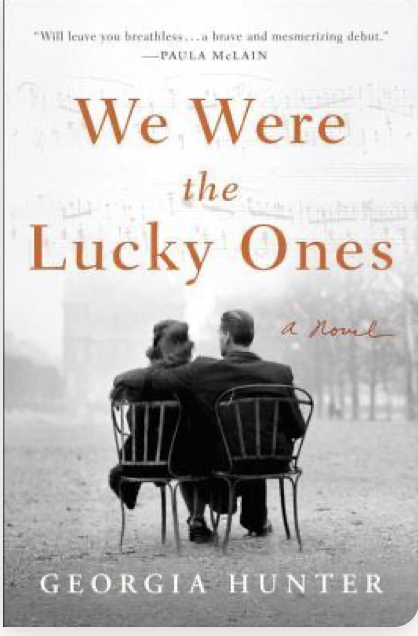
Recent Reviews

We Were The Lucky Ones by Georgia Hunter
There are really no words to describe the vicious cruelty inflicted by the Nazis and their collaborators on Jewish communities during WWII. Many groups experienced the brutality of the Nazis. But the systematic terror of the Jews was beyond horrific. This novel is a testament to one family’s luck, grit and love during one of the darkest chapters of human history.
Georgia Hunter’s fictionalized story We Were The Lucky Ones is based on the experiences of the Kurc Family: her grandfather, his four siblings and their parents who lived in Radom, Poland. When the Nazis invaded Poland in 1939, the author’s grandfather and his siblings were all in their twenties. As Jews, their safety became tenuous since the Nazis had no problem dragging people from their homes to send them to camps or simply shooting them on the spot. The plight of all these family members is gripping as they make different decisions about how best to stay alive.
Millions of Jews were shot, starved, tortured, and treated like animals. Georgia Hunter’s family was indeed lucky to have survived. Their physical and emotional endurance was strong, while their stories were terrifying and miraculous. They all suffered through six years of fear, uncertainty, starvation, violence and brutality. The melding of non-fiction and fiction makes the book more complicated, yet reading what happened to the Kurc family is to bear witness to the horrors of the Holocaust and the triumph of the human spirit. 4/5

A Place For Us by Fatima Farheen Mirza
This is a nuanced and deeply felt novel about the burden and gifts of familial love. It is an impassioned story of love and betrayal within a Muslim Indian American family living in Northern California. Fatima Farheen Mirza beautifully depicts the simmering tension within this family dynamic. Her writing is filled with psychological insights about the struggle between respecting one’s family and forging one’s own path.
The novel opens with a wedding. Layla and Rafiq’s oldest daughter, Hadia, is marrying a man she loves rather than allowing her parents to select her husband. They have come to peace with her decision but feel trepidation about their prodigal son Amar. After three years of not speaking to his family, Amar has consented to attend Hadia’s wedding.
Layla and Rafiq poured their love, time and resources into their children. They are devout Muslims passionate that their three children should respect and follow their religious life. But their American born children have broader perspectives on what they want. The two sisters were able to work around their parents with finesse, but Amar was brash, bright, and persistently questioned his parents’ authority and the edicts of Islam.
The novel is filled with flashbacks to when the three siblings were young. Amar’s return provokes the five family members to reflect on the large and small events that caused his dramatic departure. His three-year absence has caused pain and shame within their family and within their community. Layla and Rafiq recall their interactions with Amar and realize that their religious rigidity shaped his belligerent behavior and the problems that ensued. Though real love and good intentions existed, Layla and Rafiq’s limitations and betrayals tore the family apart.
Though the novel’s beginning was confusing due to the shifting narration, Mirza’s dissection of this family’s dynamic is impressive. With depth and understanding she seeks to answer the question: Why did these characters behave the way they did individually and within their family? She was only 27 years old when this novel was published. A Place for Us is a notable achievement, 4/5.

Long After We Are Gone by Terah Sheldon Harris
Terah Shelton Harris’ novel about racial injustice and family dynamics is absorbing. Long After We Are Gone explores the complexity of family bonds and the agility required to meet family expectations without losing oneself.
When King Solomon passes, his four adult siblings gather to bury him and settle his estate. His death forces the siblings to confront their own demons and the injustice of discrimination and bigotry. Set in present-day North Carolina, the four Solomon siblings seek to honor their father’s last words: “Don’t let the white man take the house.” The house to which he refers was built by Solomon in 1782. But with Solomon’s passing, development companies want to buy the house and the two hundred acres of land using a legal loophole called “heir property.” Because Black families didn’t trust the white court system, many families didn’t write wills. So, “heir property” is the mechanism by which descendants inherit an interest in the land, but their ownership does not constitute a clear title. If one “heir property” owner is willing to sell, the entire property becomes vulnerable to purchase. Their father’s brother wants to sell.
After receiving an eviction notice, the four Solomon siblings, Junior, Mance, Cecily, and Tokey, must wrestle with their need for money and loyalty to their father’s dying wish. The siblings can’t unite and plan until they are truthful with one another. The secrets and lies they have told themselves and each other emerge. After years of superficiality and silence, King’s children communicate honestly and begin to fight for their ancestral home.
The emotional baggage they each carry is heavy and unique. In addition, the siblings are haunted by their mother’s absence, whose name their father never uttered. But after King’s death, they learn about her life and become more open to speaking their truths. Hovering over this crisis is the trauma and injustice their ancestors experienced living on this land during slavery, Civil War and the cruel Jim Crow laws.
Some stereotypes and caricatures distract from the narrative. And yet, Long After We Are Gone is a story about balancing familial expectations with the need to be true to oneself. The surprising ending might be too simple and fast. Nonetheless Terah Shelton Harris’ novel is a compelling story of reconciliation and redemption. 4/5
